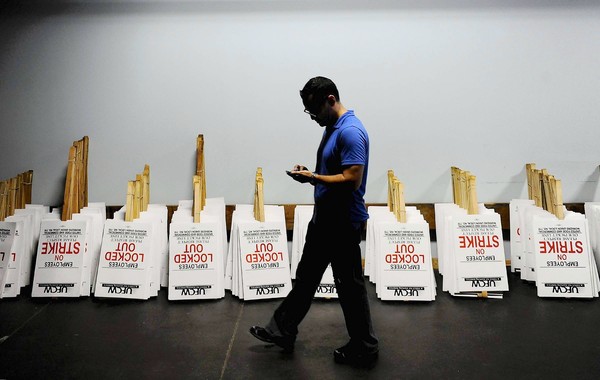Supreme Court Declines Review of California Protest Laws

On June 10, 2013, the U.S. Supreme Court denied a petition to review Ralphs Grocery Company v. United Food and Commercial Workers Union Local 8. The suit involved two California protest laws that provide broad protection to protestors in labor-related disputes.
The plaintiff sought to prevent a union from protesting outside a Sacramento-area Foods Co. Since opening in 2007, union protestors have picketed the entrance five days a week, eight hours per day.
Attorneys for Ralphs argued that California protest laws awarded “special privileges” to labor unions, allowing them to trespass on private property. Further, they said the laws made it “virtually impossible” for California Courts to stop even disruptive labor-related protests.
Section 527.3 of the California Code of Civil Procedure says that “no court” has jurisdiction to enjoin “peaceful picketing” involving labor disputes. The Legislature enacted Section 527.3 in 1975 as part of the Moscone Act to mirror the federal Norris-LaGuardia Act, enacted in 1932.
According to Section 527.3(a), the purpose of the Act is to “promote the rights of workers” in “collective bargaining, picketing or other mutual aid or protection.” Subsection (e) excludes unlawful conduct from its protections.
The Legislature enacted Section 1138.1 of the California Code of Civil Procedure in 1999 to mirror other provisions from the 1932 Norris-LaGuardia Act. Under 1138.1, businesses seeking to prevent labor-related protest must show, among other things, that the protest will cause “substantial and irreparable injury.”
accused Ralphs of "pervert" the First Amendment to create a right of private actors to “restrict speech through court action.”On December 27, 2012, the California Supreme Court reversed a lower court decision that found the laws unconstitutional. The lower court found that the act violated the First and Fourteenth Amendments because they gave “preferential treatment” to labor-related speech over other issues. Protests concerning religion, the military, or equal rights may be enjoined as trespassing.
With labor-related protests, the property owner must demonstrate that "unlawful acts have been threatened and will be committed" (a)(1), that "substantial" injury will follow (a)(2), and the public officers are "unwilling or unable" to intervene (a)(5).
The California Supreme Court disagreed. Quoting LA Alliance for Survival v. City of LA, it said that content-based regulations need only be "'justified' by legitimate concerns that are unrelated to any 'disagreement with the message' conveyed by the speech."
After the ruling, it seems that some categories of speech are better than others.




